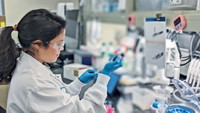Advertisement
Grab your lab coat. Let's get started
Welcome!
Welcome!
Create an account below to get 6 C&EN articles per month, receive newsletters and more - all free.
It seems this is your first time logging in online. Please enter the following information to continue.
As an ACS member you automatically get access to this site. All we need is few more details to create your reading experience.
Not you? Sign in with a different account.
Not you? Sign in with a different account.
ERROR 1
ERROR 1
ERROR 2
ERROR 2
ERROR 2
ERROR 2
ERROR 2
Password and Confirm password must match.
If you have an ACS member number, please enter it here so we can link this account to your membership. (optional)
ERROR 2
ACS values your privacy. By submitting your information, you are gaining access to C&EN and subscribing to our weekly newsletter. We use the information you provide to make your reading experience better, and we will never sell your data to third party members.
Biological Chemistry
KSQ launches with $76 million in funding
The biotech firm hopes its high-throughput CRISPR screening platform will crack open a new range of oncology and immunology drug targets
by Lisa M. Jarvis
October 2, 2017

KSQ Therapeutics has emerged from stealth with $76 million in funding from Polaris Partners to try to use the powerful gene-editing tool CRISPR to crack open a swath of new drug targets.
Many of the biotech firms focused on CRISPR are trying to turn the gene-editing technology into a therapeutic. Cambridge, Mass.-based KSQ, on the other hand, is interested in exploiting CRISPR’s value as a drug discovery tool. Based on the work of its academic founders David Sabatini and Tim Wang from MIT; William Hahn from the Broad Institute of Harvard & MIT; and University of California, San Francisco’s Jonathan Weissman, KSQ has developed a high-throughput method of using CRISPR to probe gene function.
As recently as five years ago, academic and industry researchers were reliant on siRNA or short hairpin RNA to screen for possible drug targets. But RNAi is widely known to result in false positives, making it difficult to decipher a gene’s function and value as a target.
RNAi is “a powerful, but very imprecise tool,” says KSQ’s chief scientific officer, Frank Stegmeier, who was previously head of oncology-target discovery at Novartis. “Now that I have the precision of CRISPR, especially with the proprietary libraries we’ve developed at KSQ, it’s really remarkable how precisely we can interrogate gene function.”
Since opening its doors in 2015, KSQ has completed genome-wide screens for roughly 600 cancer and immune-based models. “This is ultimately the most well-defined cancer dependency map ever generated in the world,” Stegmeier claims.
David Meeker, who in June stepped down as head of Sanofi Genzyme, last month joined KSQ as CEO. He is leading a team that already spans 40 employees, a headcount he expects to roughly double in size in the next year. The team is initially focused on oncology and immunology, but Meeker notes the platform has broader potential.
KSQ is not the only new biotech firm trying to build a platform that takes advantage of CRISPR’s ability to elucidate gene function. Third Rock-backed Tango Therapeutics and Versant Ventures-founded Repare Therapeutics each debuted earlier this year with substantial financing to use deep sequencing and CRISPR-based screens to find specific types of oncology drug targets.
CORRECTION: This story was updated on Oct. 2, 2017, to correct the funding amount for KSQ. It is $76 million, not $78 million.



Join the conversation
Contact the reporter
Submit a Letter to the Editor for publication
Engage with us on Twitter